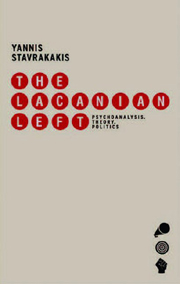Book contents
- Frontmatter
- Contents
- Bibliographical Note
- Acknowledgements
- Dedication
- Introduction: Locating the Lacanian Left
- PART I Theory: Dialectics of Disavowal
- 1 Antinomies of Creativity: Lacan and Castoriadis on Social Construction and the Political
- 2 Laclau with Lacan on Jouissance: Negotiating the Affective Limits of Discourse
- 3 Žižekian ‘Perversions’: The Lure of Antigone and the Fetishism of the Act
- PART II Analysis: Dialectics of Enjoyment
- Bibliography
- Index
3 - Žižekian ‘Perversions’: The Lure of Antigone and the Fetishism of the Act
from PART I - Theory: Dialectics of Disavowal
Published online by Cambridge University Press: 12 September 2012
- Frontmatter
- Contents
- Bibliographical Note
- Acknowledgements
- Dedication
- Introduction: Locating the Lacanian Left
- PART I Theory: Dialectics of Disavowal
- 1 Antinomies of Creativity: Lacan and Castoriadis on Social Construction and the Political
- 2 Laclau with Lacan on Jouissance: Negotiating the Affective Limits of Discourse
- 3 Žižekian ‘Perversions’: The Lure of Antigone and the Fetishism of the Act
- PART II Analysis: Dialectics of Enjoyment
- Bibliography
- Index
Summary
Žižek's revolutionary act: a vanguard for the Lacanian Left?
My engagement with the work of Laclau has focused on the importance of combining a Lacan-inspired awareness of lack and of the limits of discourse (the Lacanian conceptualisation of negativity qua encounter with the real) with a more substantive dimension, crucial for understanding political life and especially the affective aspect of identification processes: the axis of enjoyment in its different modalities and in its continuous interaction with the discursive constitution of our social and political reality, with the materiality of the signifier. As we have seen, such an articulation requires a delicate balancing act between negativity and positivity. If the chances of succeeding in this endeavour seem rather promising in the case of reorienting critical political theory, things become blurred when at issue is the ethico-political impetus of the Lacanian Left, when, that is, ‘what is to be done?’ and ‘how?’ come to the forefront as the central questions. In an effort to avoid the supposed reformist direction implicit in every politics which registers the unavoidable encounter with the negative, two major figures, absolutely central in this emerging terrain, Alain Badiou and Slavoj Žižek, have generally opted for a different strategy. Through their various formulations of the ‘event’ and the ‘act’ respectively, they have consistently attempted to reintroduce the dimension of radical – even ex nihilo – socio-political change into the admittedly complacent horizon of existing democracies.
- Type
- Chapter
- Information
- The Lacanian LeftPsychoanalysis Theory Politics, pp. 109 - 160Publisher: Edinburgh University PressPrint publication year: 2007



